A
Auto Express
Guest
Hyundai’s best-selling models are SUVs and crossovers, and now the Korean brand has revealed that it plans to add another to its line-up. The new model, called the Hyundai Bayon, will arrive in the UK in the middle of 2021 as a new entry-point into the manufacturer's crossover range.
Previewed in our exclusive images, the Bayon will be based on the same platform as the latest i20 supermini, so will sit below the Kona in Hyundai’s current line-up.
Official specifications of the new car have yet to be confirmed, but the Bayon is expected to share its chassis and powertrain configuration with the i20. The supermini currently has a petrol-only line-up, consisting of an 83bhp 1.2-litre four-cylinder unit and a turbocharged 1.0-litre three-cylinder mild hybrid, with either 99bhp or 118bhp.
Elements of the i20’s cabin, like its distinctive four-pronged steering wheel and eight-inch infotainment system will be carried over to the new crossover, as spy shots reveal. Flagship models should also come with Hyundai’s latest infotainment set-up, which features two 10.25-inch digital screens – one for the instrument cluster and one to handle the car’s media and navigation.
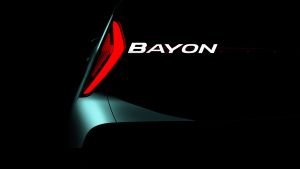
image
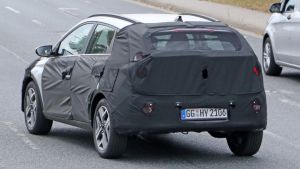
image
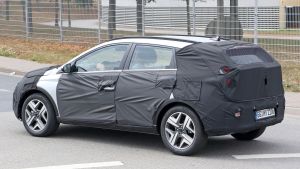
image
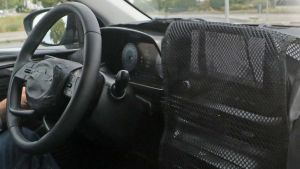
image
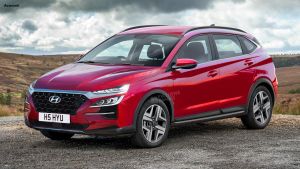
image
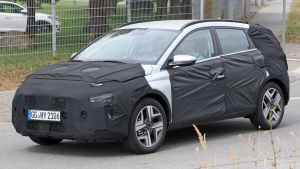
image
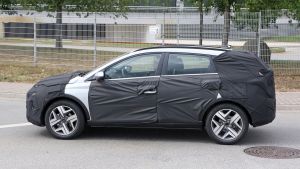
image
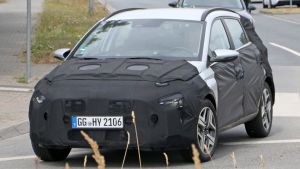
image
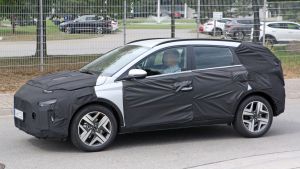
image
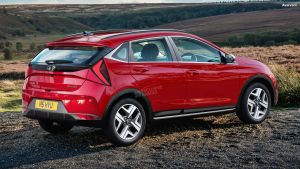
image
For now, the only official image we have of the Bayon is a shadowy teaser, which previews the SUV’s tailgate and rear light design. Hyundai also insists that the Bayon will be more than just a jacked-up i20 in some plastic body cladding. A spokesperson for the brand told us that, apart from the rear doors, every panel on the fresh crossover will be new.
Our spy shots provide a better indication of the Bayon’s styling and mini-crossover proportions; look closely and you can also make out Hyundai’s distinctive split-headlamp design that features on other models such as the Santa Fe and Kona.
The introduction of the Bayon also gives Hyundai the opportunity to experiment with the next generation of the Kona, because when the Bayon lands next year, both will be fighting for similar customers.
When the Kona is replaced in around three years’ time, it’ll go the same way as the Tucson and Santa Fe, growing in size for its next generation. Hyundai hopes this will remedy the biggest criticisms of the SUV: its cramped rear cabin and small boot.

image

image

image

image

image

image

image

image

image

image
Hyundai has also hinted at the possibility of the next-generation Kona going electric-only. The firm sold 3,500 examples of the current Kona Electric in the UK last year, which is around 30 percent of the car’s total sales figures – so the business case for such as decision is certainly strong.
Making the Kona range all electric would also provide plenty of breathing space in the Korean company’s overall line-up for the petrol-only Bayon, before the Government’s ban on internal-combustion-engined cars comes into force in 2030.
Speaking about the upcoming Bayon, Andreas-Christoph Hofmann, Hyundai’s Vice President of Marketing, said: “Hyundai is strongly established in the European SUV market already, in terms of our model range as well as our sales success.
“By launching a new, additional B-segment model as the entry point into our SUV line-up,” he continued, “we see a great opportunity to cover European customers’ demand even better and to increase our offering in a highly popular segment.”
What do you think of our exclusive Hyundai Bayon images? Let us know your thoughts in the comments section...
Continue reading...
Previewed in our exclusive images, the Bayon will be based on the same platform as the latest i20 supermini, so will sit below the Kona in Hyundai’s current line-up.
- SEE MORE Hyundai Kona review
Official specifications of the new car have yet to be confirmed, but the Bayon is expected to share its chassis and powertrain configuration with the i20. The supermini currently has a petrol-only line-up, consisting of an 83bhp 1.2-litre four-cylinder unit and a turbocharged 1.0-litre three-cylinder mild hybrid, with either 99bhp or 118bhp.
Elements of the i20’s cabin, like its distinctive four-pronged steering wheel and eight-inch infotainment system will be carried over to the new crossover, as spy shots reveal. Flagship models should also come with Hyundai’s latest infotainment set-up, which features two 10.25-inch digital screens – one for the instrument cluster and one to handle the car’s media and navigation.

image

image

image

image

image

image

image

image

image

image
For now, the only official image we have of the Bayon is a shadowy teaser, which previews the SUV’s tailgate and rear light design. Hyundai also insists that the Bayon will be more than just a jacked-up i20 in some plastic body cladding. A spokesperson for the brand told us that, apart from the rear doors, every panel on the fresh crossover will be new.
Our spy shots provide a better indication of the Bayon’s styling and mini-crossover proportions; look closely and you can also make out Hyundai’s distinctive split-headlamp design that features on other models such as the Santa Fe and Kona.
The introduction of the Bayon also gives Hyundai the opportunity to experiment with the next generation of the Kona, because when the Bayon lands next year, both will be fighting for similar customers.
When the Kona is replaced in around three years’ time, it’ll go the same way as the Tucson and Santa Fe, growing in size for its next generation. Hyundai hopes this will remedy the biggest criticisms of the SUV: its cramped rear cabin and small boot.

image

image

image

image

image

image

image

image

image

image
Hyundai has also hinted at the possibility of the next-generation Kona going electric-only. The firm sold 3,500 examples of the current Kona Electric in the UK last year, which is around 30 percent of the car’s total sales figures – so the business case for such as decision is certainly strong.
Making the Kona range all electric would also provide plenty of breathing space in the Korean company’s overall line-up for the petrol-only Bayon, before the Government’s ban on internal-combustion-engined cars comes into force in 2030.
Speaking about the upcoming Bayon, Andreas-Christoph Hofmann, Hyundai’s Vice President of Marketing, said: “Hyundai is strongly established in the European SUV market already, in terms of our model range as well as our sales success.
“By launching a new, additional B-segment model as the entry point into our SUV line-up,” he continued, “we see a great opportunity to cover European customers’ demand even better and to increase our offering in a highly popular segment.”
What do you think of our exclusive Hyundai Bayon images? Let us know your thoughts in the comments section...
Continue reading...
